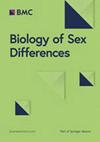XX性染色体互补以微生物依赖的方式调节对热杀灭肺炎链球菌免疫的免疫反应
IF 4.9
2区 医学
Q1 ENDOCRINOLOGY & METABOLISM
引用次数: 0
摘要
男性与女性免疫反应的差异是有据可查的,并具有重要的临床意义。虽然性激素的免疫调节作用已得到公认,但性染色体互补(XX 与 XY)和肠道微生物群多样性对免疫性双态性的贡献最近才得到重视。在此,我们研究了性染色体互补和肠道微生物群对体液免疫激活的个体和协同影响。雄性和雌性四核心基因型(FCG)小鼠用热灭活肺炎链球菌(HKSP)进行免疫。评估了体液免疫反应,并评估了 X 连锁免疫相关基因的表达,以解释已确定的 XX 依赖性表型。利用有丝分裂原刺激 B 细胞,对 Kdm6a(一种 X 连锁表观遗传调控基因)的功能作用进行了体内外评估。在进行 HKSP 免疫之前,还通过抗生素消耗肠道微生物群来评估肠道微生物群对性染色体依赖性 B 细胞活化的其他影响。用产生短链脂肪酸(SCFA)的细菌重建被耗竭的微生物群,测试了SCFA对XX依赖性免疫激活的影响。XX小鼠比XY小鼠表现出更高的HKSP特异性IgM分泌B细胞和浆细胞频率,与性腺性别无关。虽然 Kdm6a 被鉴定为在 XX B 细胞中过度表达的 X 连锁基因,但抑制其酶活性并不会影响有丝分裂原诱导的浆细胞分化,也不会以性染色体依赖的方式影响体内抗体的产生。微生物群耗竭后,XX 与 XY 免疫 FCG 小鼠增强的体液反应消失了,这表明微生物群有助于已确定的 XX 依赖性免疫增强。用精选的产生 SCFA 的细菌重组微生物群耗竭的小鼠可提高粪便中 SCFA 的浓度,并增强 XX 而非 XY FCG 小鼠的体液反应。然而,在体外研究中,单独接触 SCFA 丙酸盐并不会增强有丝分裂原 B 细胞刺激。FCG 小鼠已被用于评估性激素和性染色体互补对各种性二态性状的影响。目前的研究表明,肠道微生物组以依赖 XX 的方式影响体液反应,这表明在解释旨在阐明促进性双态性机制的数据时,应考虑肠道细菌和其他性别特异性因素的共同影响。男性和女性的免疫系统在应对传染性挑战的能力上有所不同。男性往往更容易受到感染,接种疫苗后产生的抗体量也较低,而女性则更容易患上自身免疫性和炎症性疾病。造成这些差异的主要因素包括性激素、性染色体互补(女性为 XX,男性为 XY)以及能够调节免疫激活的独特肠道微生物群落。虽然对每个因素都进行了单独研究,但这项研究强调了这些因素共同影响免疫激活的潜力。在本研究中,XX 与 XY 性染色体互补被证明能增强对热杀灭肺炎链球菌疫苗接种的抗体反应。在试图确定这种免疫增强的根本原因时,发现肠道微生物组起着至关重要的作用。在缺乏完整肠道微生物群的情况下,XX 免疫激活降低到了与拥有 XY 性染色体补体的小鼠相似的水平。用精选的可产生 SCFA 的细菌物种替代被耗竭的肠道微生物群,可提高抗生素处理的小鼠体内的 SCFA 水平,并挽救 XX 依赖性免疫增强,这表明 SCFA 起了介导作用。要确定这些选择性细菌如何以性染色体互补依赖的方式影响免疫激活,还需要进一步的研究。我们的研究结果突出表明,在试图了解免疫性别偏差时,需要考虑单个性别特异性因素的协同作用,因为更好地了解这些相互作用很可能会为改进针对两性的疗法和疫苗铺平道路。本文章由计算机程序翻译,如有差异,请以英文原文为准。
XX sex chromosome complement modulates immune responses to heat-killed Streptococcus pneumoniae immunization in a microbiome-dependent manner
Differences in male vs. female immune responses are well-documented and have significant clinical implications. While the immunomodulatory effects of sex hormones are well established, the contributions of sex chromosome complement (XX vs. XY) and gut microbiome diversity on immune sexual dimorphisms have only recently become appreciated. Here we investigate the individual and collaborative influences of sex chromosome complements and gut microbiota on humoral immune activation. Male and female Four Core Genotype (FCG) mice were immunized with heat-killed Streptococcus pneumoniae (HKSP). Humoral immune responses were assessed, and X-linked immune-related gene expression was evaluated to explain the identified XX-dependent phenotype. The functional role of Kdm6a, an X-linked epigenetic regulatory gene of interest, was evaluated ex vivo using mitogen stimulation of B cells. Additional influences of the gut microbiome on sex chromosome-dependent B cell activation was also evaluated by antibiotically depleting gut microbiota prior to HKSP immunization. Reconstitution of the depleted microbiome with short-chain fatty acid (SCFA)-producing bacteria tested the impact of SCFAs on XX-dependent immune activation. XX mice exhibited higher HKSP-specific IgM-secreting B cells and plasma cell frequencies than XY mice, regardless of gonadal sex. Although Kdm6a was identified as an X-linked gene overexpressed in XX B cells, inhibition of its enzymatic activity did not affect mitogen-induced plasma cell differentiation or antibody production in a sex chromosome-dependent manner ex vivo. Enhanced humoral responses in XX vs. XY immunized FCG mice were eliminated after microbiome depletion, indicating that the microbiome contributes to the identified XX-dependent immune enhancement. Reconstituting microbiota-depleted mice with select SCFA-producing bacteria enhanced fecal SCFA concentrations and increased humoral responses in XX, but not XY, FCG mice. However, exposure to the SCFA propionate alone did not enhance mitogenic B cell stimulation in ex vivo studies. FCG mice have been used to assess sex hormone and sex chromosome complement influences on various sexually dimorphic traits. The current study indicates that the gut microbiome impacts humoral responses in an XX-dependent manner, suggesting that the collaborative influence of gut bacteria and other sex-specific factors should be considered when interpreting data aimed at delineating the mechanisms that promote sexual dimorphism. Male and female immune systems differ in their ability to respond to infectious challenge. While males tend to be more susceptible to infection and produce lower amounts of antibodies in response to vaccination, females are more prone to develop autoimmune and inflammatory diseases. Key contributors to these differences include sex hormones, sex chromosome complement (XX in females vs. XY in males), and distinct gut microbial communities capable of regulating immune activation. While each factor has been studied individually, this research underscores the potential for these factors to collaboratively impact immune activation. Here, possession of an XX vs. XY sex chromosome complement was demonstrated to enhance antibody responses to heat-killed Streptococcus pneumoniae vaccination. While attempting to determine the underlying cause of this immune enhancement, the gut microbiome was identified to play a critical role. In the absence of an intact gut microbiome, XX immune activation was reduced to levels similar to those seen in XY sex chromosome complement-possessing mice. Replacement of the depleted gut microbiomes with select SCFA-producing bacterial species enhanced SCFA levels in antibiotic-treated mice and rescued the XX-dependent immune enhancement, suggesting a SCFA-mediated contribution. Further studies are needed to determine exactly how these select bacteria impact immune activation in a sex chromosome complement-dependent manner. Our findings highlight the need to consider the collaborative effects of individual sex-specific factors when attempting to understand immune sex biases, as a better understanding of these interactions will likely pave the way for improving therapeutics and vaccines tailored to both sexes.
求助全文
通过发布文献求助,成功后即可免费获取论文全文。
去求助
来源期刊

Biology of Sex Differences
ENDOCRINOLOGY & METABOLISM-GENETICS & HEREDITY
CiteScore
12.10
自引率
1.30%
发文量
69
审稿时长
14 weeks
期刊介绍:
Biology of Sex Differences is a unique scientific journal focusing on sex differences in physiology, behavior, and disease from molecular to phenotypic levels, incorporating both basic and clinical research. The journal aims to enhance understanding of basic principles and facilitate the development of therapeutic and diagnostic tools specific to sex differences. As an open-access journal, it is the official publication of the Organization for the Study of Sex Differences and co-published by the Society for Women's Health Research.
Topical areas include, but are not limited to sex differences in: genomics; the microbiome; epigenetics; molecular and cell biology; tissue biology; physiology; interaction of tissue systems, in any system including adipose, behavioral, cardiovascular, immune, muscular, neural, renal, and skeletal; clinical studies bearing on sex differences in disease or response to therapy.
 求助内容:
求助内容: 应助结果提醒方式:
应助结果提醒方式:


